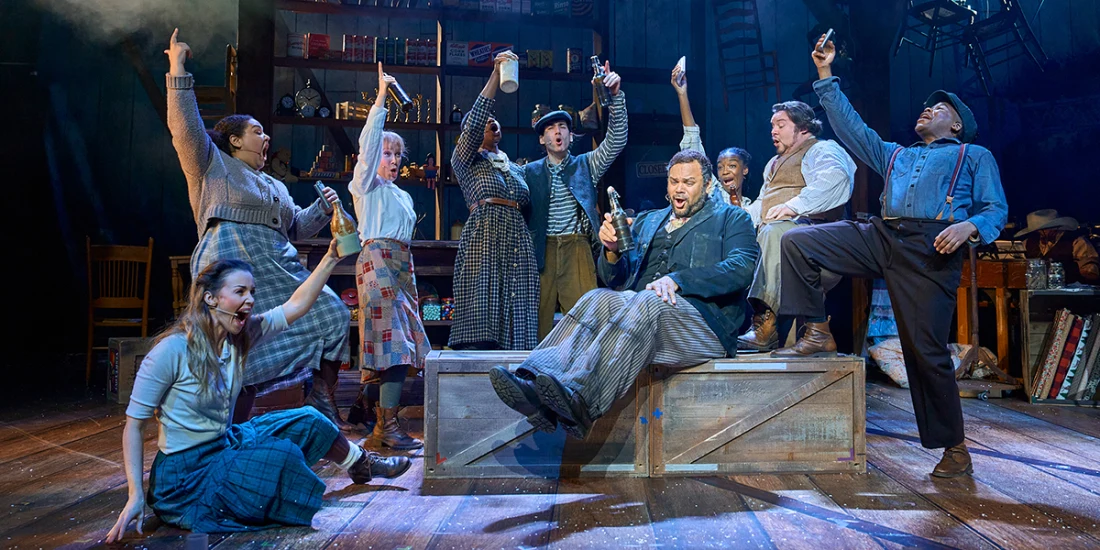'Dolly Parton's Smoky Mountain Christmas Carol' review — a country-infused seasonal delight warms the soul
How can you possibly reconceive still further A Christmas Carol, the Dickens title that seems on the verge of taking over London theatre at the moment? One unexpected answer is to hand it over to Dolly Parton, the singer-songwriter country music goddess last represented on the West End nearly 4 years ago with her stage musical, 9 to 5.
But whereas that screen-to-stage transcription was a comparatively synthetic affair, Dolly Parton’s Smoky Mountain Christmas Carol is an unexpected delight. And whilst its overtly Christian nature may come as something of a surprise to London’s inevitably more secular audience, the show itself, and Alison Pollard’s deeply affectionate rendering of it, fairly brim with sincerity and heart.
I felt the odd tear moistening my eye well before the final reprise of “Circle of Love”, one of the many musical earworms in Parton’s score: and many will note the resemblance of that title to a certain time-honoured Disney song that taps into a similarly wide embrace. (The difference is that these lyrics specifically reference God’s love.)
The setting here are the Smoky Mountains of East Tennessee during the 1930s —that’s to say rural Appalachia where the 76-year-old Parton was herself born into poverty. It’s “the season of generosity and charity,” but a crusty Ebenezer Scrooge (Robert Bathurst) is having none of it.
Jacob Marley has died, and so Scrooge is busy serving foreclosures even as the locals await a blizzard: “It’s colder than cold,” both in the world at large and within Scrooge’s heart. On these chilly evenings just now, visitors to the South Bank will surely agree.
The status quo is upended by the reappearance of Marley in the growly presence of a hard-working George Maguire — like most of the cast, the Olivier-winning Maguire juggles multiple roles. Three ghosts, it seems, will manifest within as many hours in an attempt to kick the nightshirt-wearing Scrooge into a newly engaged and empathic life.
There’s no one called Belle in this iteration, nor will you find satsumas or mince pies falling from above, as at the Old Vic. The references instead are to hayrides, maple syrup, and oatmeal served with raisins.
“People need Christmas, all people – even you,” an avuncular Ghost of Christmas Present (Minal Patel) informs our anti-hero, who is forced to confront his younger self before taking the second chance on life that he hasn’t thought could be possible. (The scenes of the older Scrooge re-examining his past put me rather improbably in mind of a honky-tonk version of Stephen Sondheim’s Follies.)
David H. Bell’s book may at times take the nearby availability of syrup a bit too literally, even if that liquid is seen here to contain not inconsiderable amounts of alcohol. You don’t expect this sort of adaptation to strive for Steinbeck-style verisimilitude about a citizenry under economic or even racial stress.
But taken on its own, openhearted terms, the show captivates throughout, buoyed aloft by music and lyrics from Parton that range from plaintive solos and duets to rousing company numbers with titles like “Good Time”: you get what it says on the tin but with more exuberance (and, may I say, better American accents) than I had anticipated.
Bathurst more often than not makes an agreeably bemused surveyor of Scrooge's life, while a firm-voiced Danny Whitehead does the bulk of the vocal heavy lifting as both the young Scrooge and the mother-less Fred, nephew to the senior Scrooge. There’s outstanding musicality from a clarion-voiced Sarah O’Connor, and I loved the Fiddler On the Roof-style side-of-the-stage presence of Corey Wickens as a purely fiddle-playing Ghost of Christmas Future.
Scott Davis’s set, hanging chairs and all, makes deft use of a tricky space: the Queen Elizabeth Hall isn’t the ideal venue for theatre, which only redoubles this production’s achievements. (I liked the large box on view of Tide detergent, even if that washing powder wasn’t actually introduced, apparently, until 1946.) And given that musicals more often than not require change, it seems right that Scrooge only lets loose in song at the eleventh hour to sing the inevitable paean to self-transformation called – what else? – “I’ve changed.”
Spurious uplift in musicals runs all too rampant, but the sentiment here is fully earned as Scrooge learns the never-too-late value in acquiring a generosity of spirit. Those wondering where to begin that purchase could start by attending this show.
Dolly Parton's Smoky Mountain Christmas Carol is at Queen Elizabeth Hall through 8 January. Book Dolly Parton's Smoky Mountain Christmas Carol tickets on London Theatre.
Photo credit: Dolly Parton's Smoky Mountain Christmas Carol (Photo by Manuel Harlan)
Originally published on

